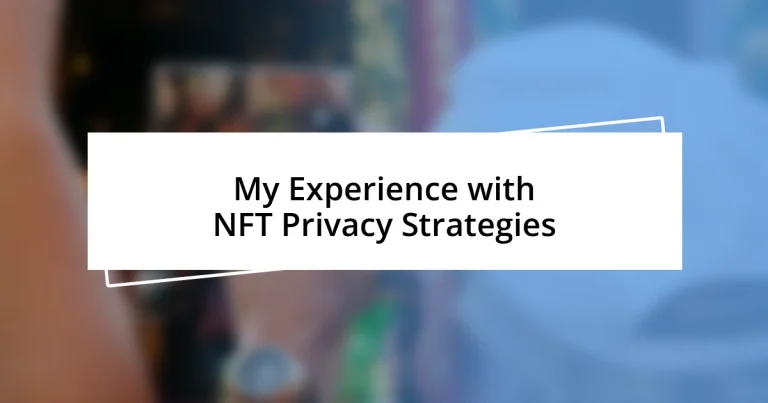Key takeaways:
- Privacy is essential in the NFT space due to the permanence of blockchain transactions, which can link wallet addresses to personal identities.
- Implementing anonymity techniques, such as using multiple wallets and privacy-focused wallets, significantly enhances security and protects personal information.
- As technology evolves, future privacy trends may include innovations like zero-knowledge proofs and increased community awareness regarding privacy practices.
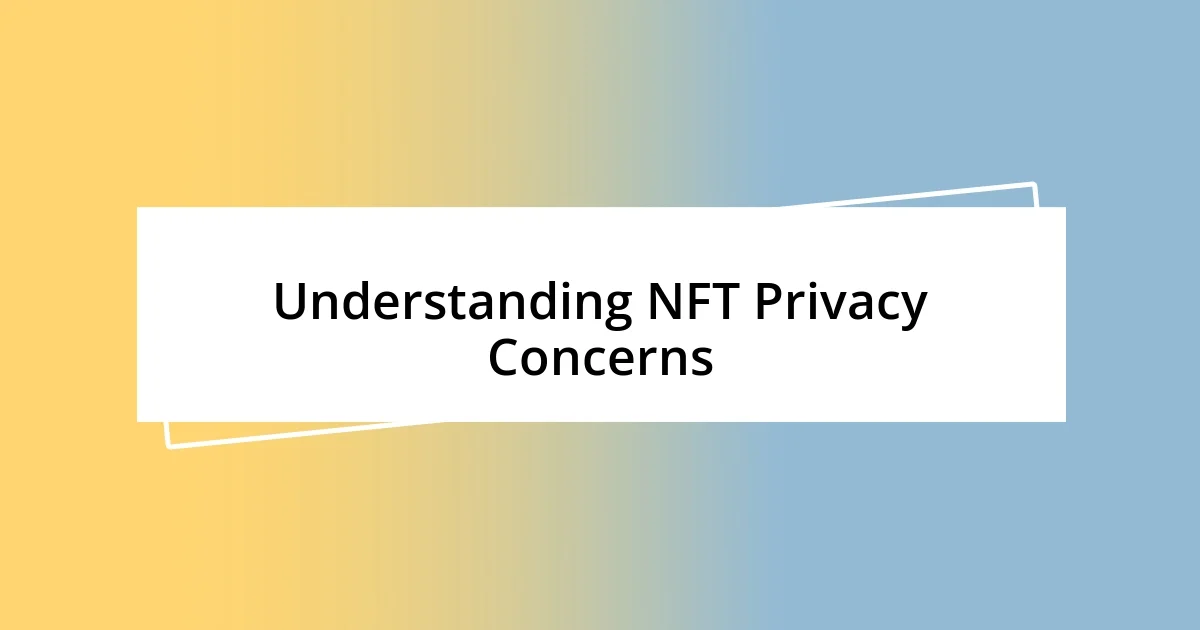
Understanding NFT Privacy Concerns
When diving into the world of NFTs, I quickly realized that privacy isn’t just a luxury; it’s a necessity. I remember the first time I posted about a new NFT I had purchased. The influx of unsolicited messages made me wonder: was I jeopardizing my personal information just by sharing my excitement? This moment highlighted how easily our identities can become tangled in the digital realm.
NFTs operate on blockchain technology, which, while secure, can expose much more than we might think. Each transaction becomes a permanent record, potentially linking my wallet address to my identity. I recall a conversation at a digital art fair where someone expressed concern over being doxxed simply for owning a specific NFT. That discussion really opened my eyes to the layers of vulnerability we might not be considering in our pursuit of digital ownership.
I often find myself questioning how much of our lives we are willing to disclose in exchange for virtual art. The desire for community can sometimes clash with the need for discretion. For instance, I used to enthusiastically join online NFT forums, sharing my collection, until I realized the trade-off: how many details was I unintentionally revealing? This reflective process underscores the importance of being intentional about what we share and with whom in this rapidly evolving landscape.
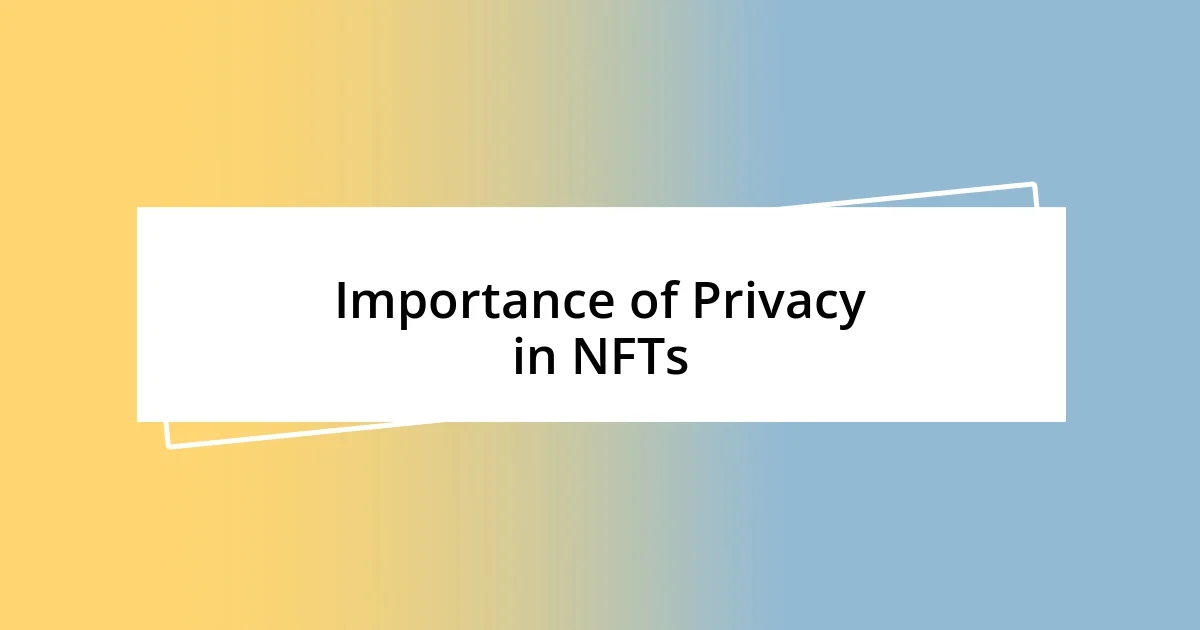
Importance of Privacy in NFTs
When I first entered the NFT space, I was amazed by the creativity and community, but I quickly discovered that privacy is paramount. I remember attending a virtual art exhibit and proudly displaying my collection. However, I realized that sharing my wallet address could inadvertently expose my financial details. That realization shifted my perspective; visibility can lead to vulnerability, and protecting ourselves should always come first.
The unique nature of NFTs, being tethered to public blockchains, makes it easy to track ownership and transaction histories. This transparency might seem appealing, but it’s crucial to consider how much of ourselves we’re exposing. I once overheard a discussion where an artist expressed her fear of being recognized by her NFT sales. It struck me how artists might want their work to shine, yet at the same time, some valued their anonymity and privacy just as much as their creations. This duality is essential in our digital interactions, and it’s something we must navigate carefully.
Moreover, as the NFT market continues to grow, so too do the risks associated with privacy breaches and personal data exposure. I recall an instance where a friend’s wallet was compromised after he connected with a seemingly benign platform to showcase his NFTs. This event was a stark reminder of how quickly things can go wrong. By choosing privacy-focused strategies, we can enjoy the benefits of NFTs while safeguarding our personal lives against the potential pitfalls lurking within this exhilarating ecosystem.
| Aspect | Importance |
|---|---|
| Protection of Identity | Maintains personal anonymity in transactions |
| Security Against Hacks | Reduces risk of wallet compromise |
| Control Over Shared Information | Allows selective sharing of NFT ownership |
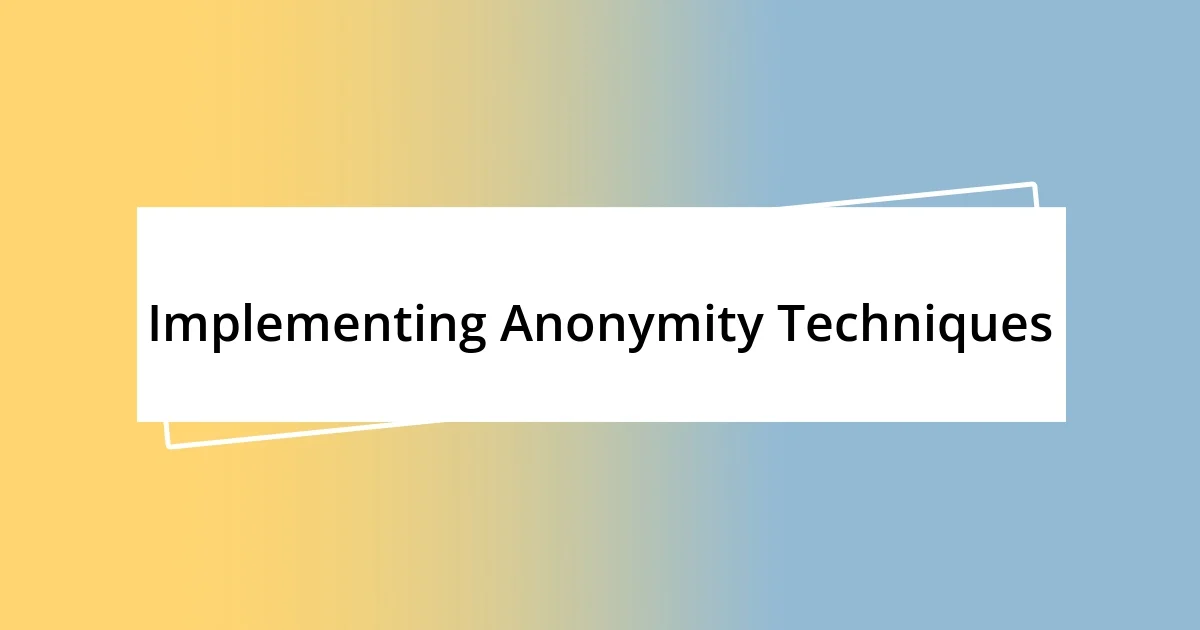
Implementing Anonymity Techniques
Implementing techniques for anonymity in the NFT space has become essential for those who want to protect their identities. For me, incorporating these strategies transformed how I approached my NFT interactions. I decided to create a separate wallet specifically for my NFT transactions, allowing me to compartmentalize my digital life. The feeling of security that came with knowing my primary wallet—associated with my personal information—was insulated from potential exposure was a huge relief.
Here are some techniques I’ve found particularly effective for maintaining anonymity in the NFT world:
- Use Multiple Wallets: By diversifying my transactions across several wallets, I can obscure the connections between my activities.
- Avoid Linking Social Media: I learned the hard way that connecting my online profiles to NFT platforms can blur the lines of privacy, so I keep my accounts separate.
- Engage in Private Transactions: Participating in private sales or using decentralized exchanges can minimize public visibility on my purchases.
- Consider Pseudonyms: Adopting a username that doesn’t reveal personal information can help maintain a level of separation from my real identity.
- Leverage Privacy Coins: Exploring options like Monero for transactions adds an extra layer of anonymity that I find comforting.
As I developed these tactics, I noticed a shift in my mindset; it empowered me to explore the NFT landscape without the nagging fear of exposure. Each small step I took made me feel more in control, enhancing my enjoyment of this vibrant community while safeguarding my privacy.
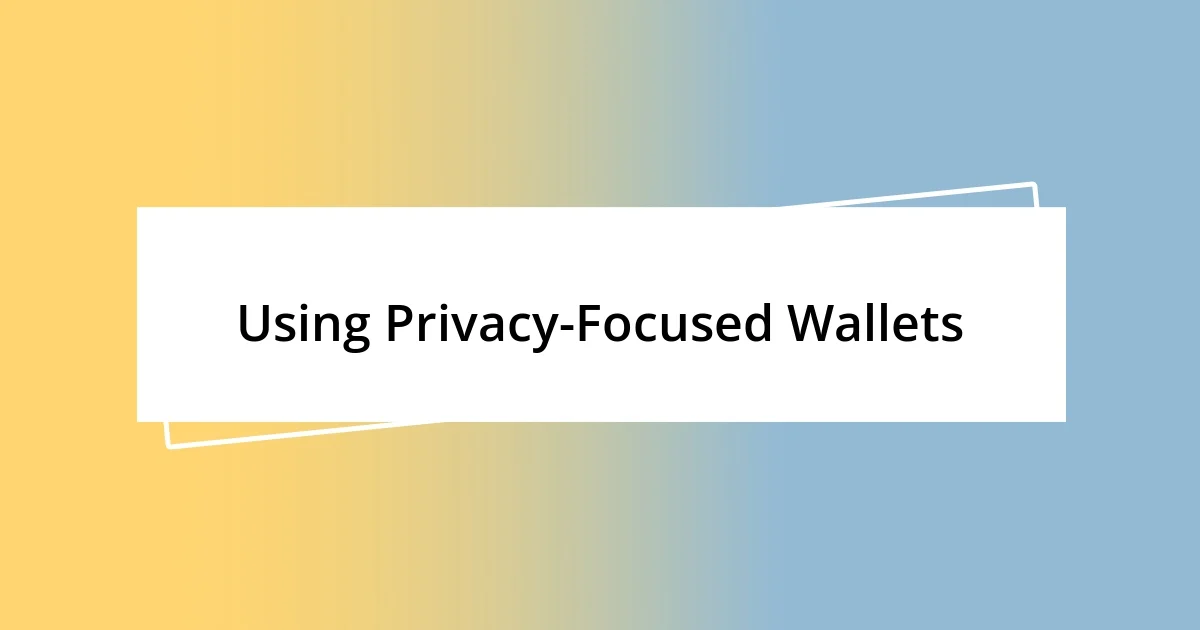
Using Privacy-Focused Wallets
Using privacy-focused wallets has been a game changer for me in the NFT space. Initially, I was hesitant to switch from my usual wallet, fearing that the unfamiliarity might complicate my transactions. But once I made the leap, I felt a palpable sense of relief knowing that my personal data was much less exposed. Just think about it: how many times have you felt uneasy about someone potentially peering into your financial moves? For me, the idea of having a separate, privacy-centric wallet offered instant peace of mind.
One standout experience occurred when I transferred my NFTs to a privacy-focused wallet and noticed how straightforward and secure the interface was. Its built-in anonymity features enabled me to buy and sell without constantly worrying about my transaction history being tied to my identity. I remember thinking, “Why didn’t I do this sooner?” As I navigated various NFT marketplaces, the increased control I felt over my information was liberating. It’s remarkable how such a simple shift can transform your overall experience and let you enjoy the art rather than dwell on potential vulnerabilities.
Moreover, I realized that privacy-focused wallets often come with added security features—multisig capabilities, for instance. When I set up multisig on my new wallet, it struck me how much stronger my defenses became against hacking attempts. Reflecting on my previous experiences, I felt like I was finally taking control of my digital narrative. Isn’t that what we all want—to make our digital identities our own? For me, adopting a privacy-focused wallet was like finding a fortress in an otherwise unpredictable landscape.
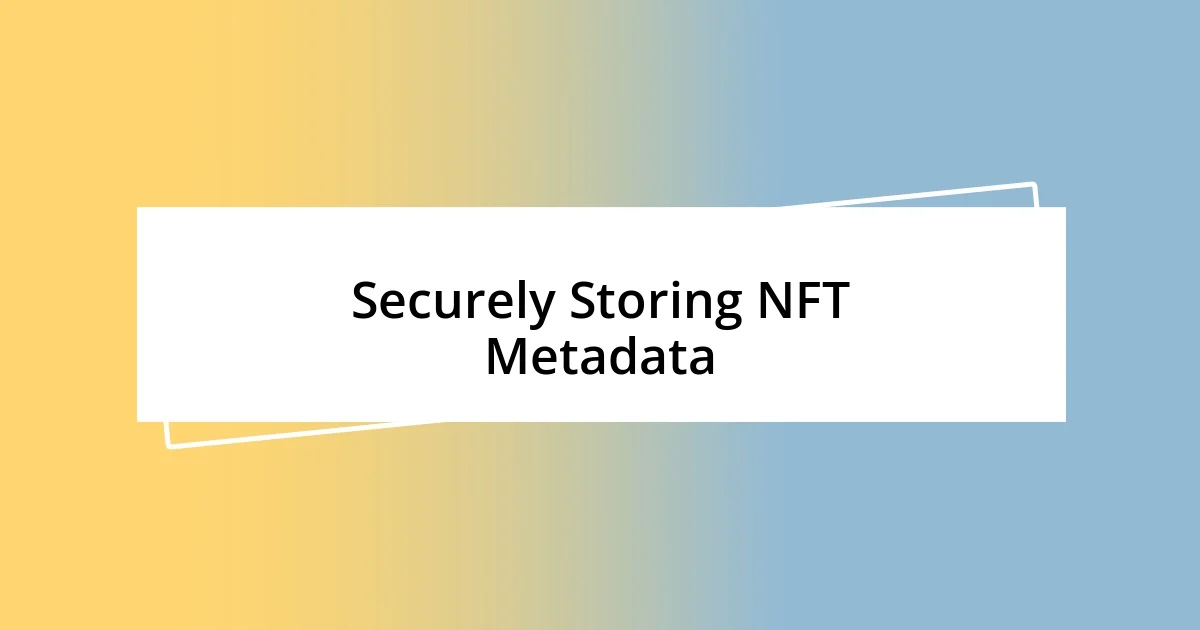
Securely Storing NFT Metadata
When it comes to securely storing NFT metadata, I discovered the significance of using decentralized storage solutions like IPFS (InterPlanetary File System). This not only ensures that my metadata is stored off-chain, reducing the risk of data tampering, but it also grants me the autonomy to manage my digital assets with confidence. Imagine the comfort I felt knowing my NFTs were backed by a decentralized system, making it almost impossible for anyone to alter vital information. Isn’t it reassuring to think about the longevity of assets that aren’t tied to a single point of failure?
Another layer of security I’ve embraced is encrypting my NFT metadata before uploading it to any platform. This practice adds a shield around my digital creations, making it significantly harder for unauthorized access. I remember the first time I sent an encrypted file; it felt like I had fortified my precious artwork behind an impenetrable wall. The thought that my data would remain unreadable unless you have the right decryption key is a beautiful form of empowerment. Have you ever felt that rush of taking control over your data? It’s exhilarating!
Lastly, I learned the importance of regularly updating my security practices to adapt to the ever-evolving landscape of NFTs. For instance, as vulnerabilities become known, I find it essential to stay informed and make necessary changes to my storage approach. Reflecting on my journey, I often ask myself whether I’m doing enough to safeguard my digital heritage, and I can confidently say that being proactive has made all the difference. It’s not just about storing data; it’s about creating a safe home for my digital identity and ensuring its protection against potential threats.
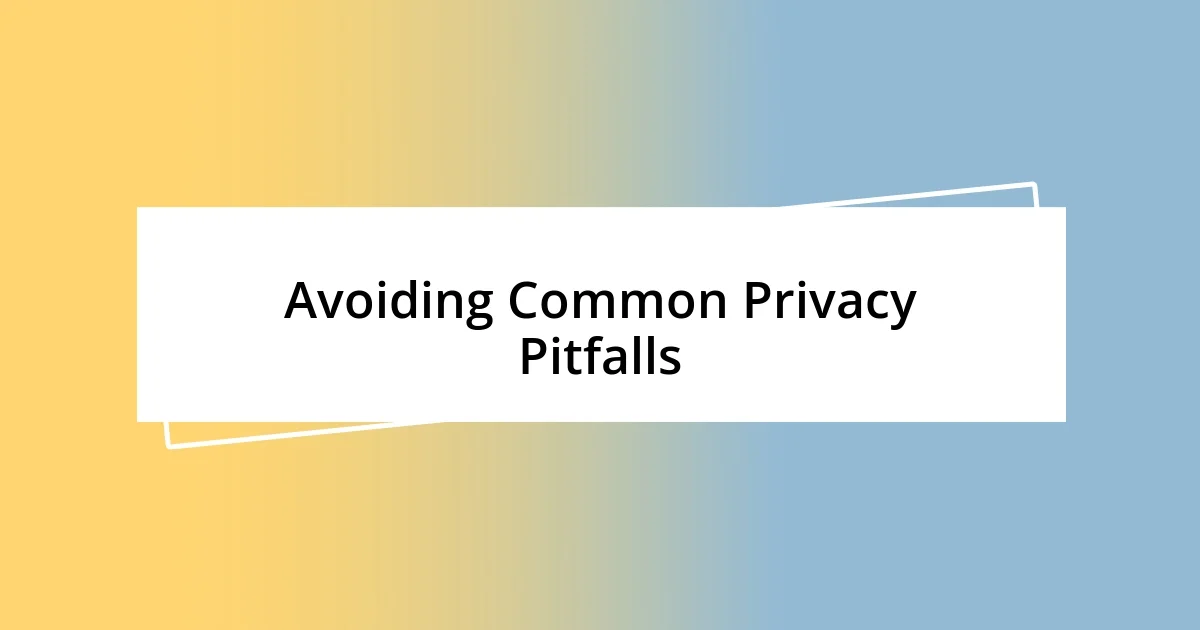
Avoiding Common Privacy Pitfalls
The most common mistake I see people making is neglecting to use strong passwords, which can lead to daunting privacy pitfalls. It might sound basic, but I remember the panic I felt when I realized my weak password could be easily cracked. I quickly learned that using a mix of letters, numbers, and symbols—and updating my passwords regularly—was essential. Trust me, having a unique password for each wallet or account can be the difference between keeping your assets safe and experiencing a major headache.
Another pitfall is not being mindful of sharing personal information online. I’ve had moments where I casually mentioned my NFT investments in social media conversations. Later, I realized how it could inadvertently put my privacy at risk, especially when people can piece together my digital footprint. Now, I question whether every detail I share online is worth the potential exposure. Why give anyone a roadmap to your digital life when you can maintain a level of anonymity?
Lastly, I often see newcomers overlook the importance of understanding smart contracts fully. A while back, I was excited to jump into a new NFT project and signed a contract without thorough due diligence. The experience taught me that many pitfalls lurk in the fine print, ready to trap the unsuspecting. Now, I take the time to read each line carefully. Have you ever felt the unsettling sensation of realizing you signed away your rights? Taking that extra step to comprehend the terms not only protects my assets but also builds my confidence in navigating the NFT space.
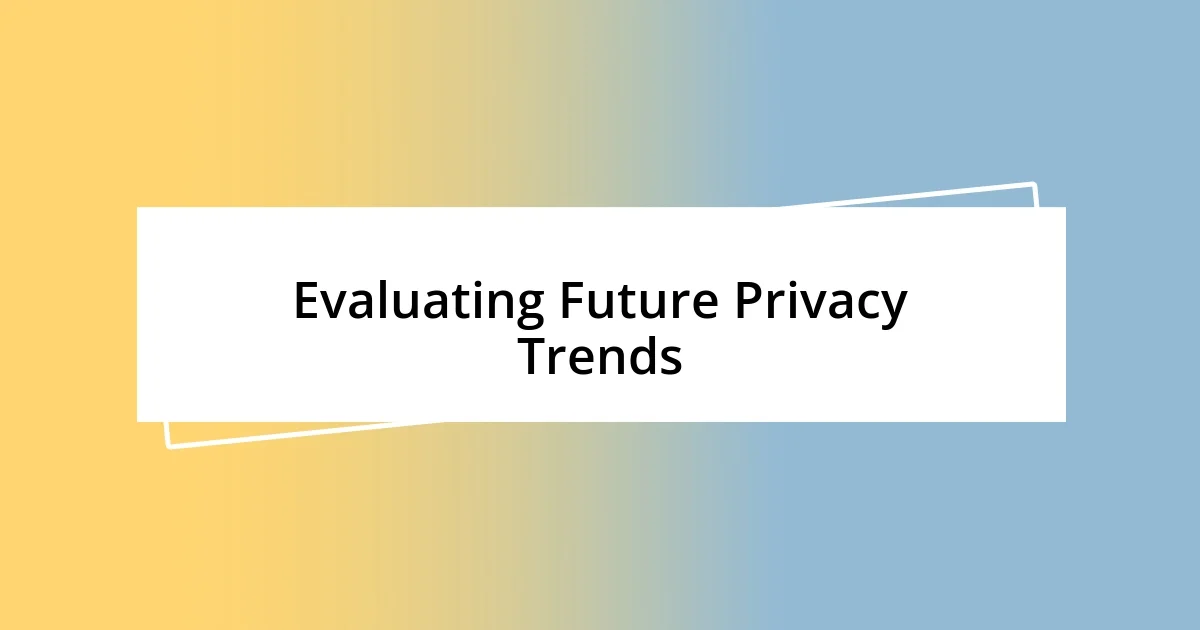
Evaluating Future Privacy Trends
Evaluating the future of NFT privacy strategies excites me, especially as technology continues to advance at lightning speed. I can’t help but feel a twinge of curiosity about how emerging technologies, like zero-knowledge proofs, could reshape our data protection landscape. Imagine being able to confirm ownership or authenticity of an NFT without revealing sensitive information. Doesn’t that sound empowering?
As I ponder this, I realize that community awareness will play a crucial role in shaping future trends. I remember a time when I participated in a webinar about NFT privacy, and the most striking takeaway was how much collective knowledge we can gain from one another. When we share experiences and best practices, we create a more informed community, which bolsters our individual privacy efforts. Have you ever thought about how being part of a community can enhance your own security measures?
Moreover, as regulatory frameworks begin to take shape around NFTs, I can’t help but wonder how these changes will impact personal privacy. I’ve found myself grappling with the balance between transparency for accountability and maintaining my privacy. For example, will there come a time when we have to publicly disclose our NFT holdings? It’s a delicate dance between protecting ourselves and contributing to a safer marketplace. What are your thoughts on this evolving dynamic? It’s a topic worth diving deeper into, isn’t it?












